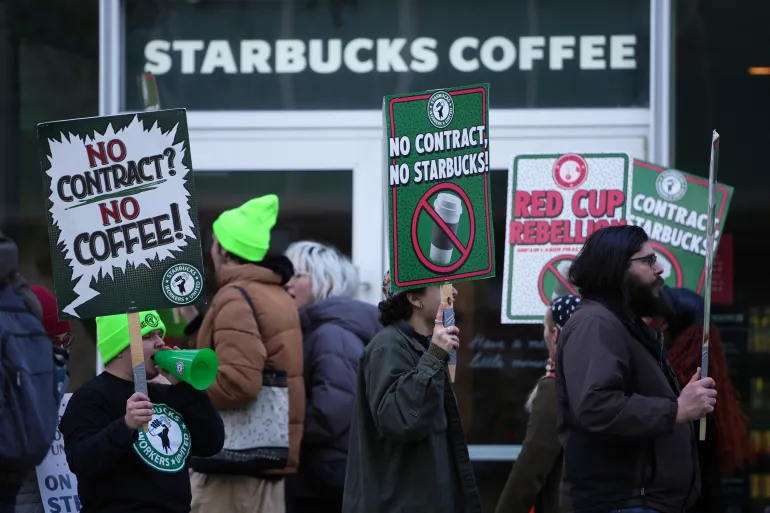More than a thousand unionised Starbucks baristas have walked off the job in more than 40 cities across the United States as negotiations have stalled between the company and the union, Starbucks Workers United.
Workers at 65 stores began an open-ended strike on Thursday, coinciding with the Seattle, Washington-based coffee shop chain’s Red Cup Day sales event, when customers who order a holiday-themed beverage can receive a free reusable cup with their purchase.
Recommended Stories
list of 4 itemsend of list
The event typically drives higher traffic to Starbucks stores.
The coffeeshop chain, which has more than 18,000 stores across the US and Canada, says that the walkouts have caused limited impact.
More stores could soon join the strike. Starbucks Workers United represents roughly 550 stores around the US. Combined, this strike could be the largest in the history of the coffeeshop chain.
Stores in cities including Seattle, New York, Philadelphia, Dallas, Austin and Portland will join the work stoppage, it said. Some locations had already shut down for the day, a union spokesperson told journalists on a media call.
In an Instagram post on Thursday, the union called on consumers not to shop at any Starbucks location “today and beyond” ahead of a nationwide rally slated to begin at 4pm local time for each location.
The union has filed more than 1,000 charges to the National Labor Relations Board for alleged unfair labour practices such as firing unionising baristas, and last week, it voted to authorise a strike if a contract was not finalised by November 13.
Starbucks has said it pays an average wage of $19 an hour and offers employees who work at least 20 hours a week benefits including healthcare, parental leave and tuition for online classes at Arizona State University.
The union said starting wages are $15.25 per hour in about 33 states and the average barista gets less than 20 hours per week.
Talks between the union and the company stretched for about eight months in 2024, but broke down in December, after which workers went on strike during the key holiday period.
“Unfortunately, it’s not unusual to see stall tactics used in collective bargaining, as we’re seeing with Starbucks. But the situation and the strike vote also demonstrate that long-term grassroots organising empowers workers. There’s strength in numbers,” Jennifer Abruzzo, former General Counsel at the National Labor Relations Board under former US President Joe Biden, said in remarks shared with Al Jazeera.
History of strikes
Starbucks workers have gone on strike several times over the last few years, starting in 2021. Workers at a location in Buffalo, New York became the first unionised store and subsequently launched a nationwide movement, which now represents four percent of the Starbucks cafe workforce, or about 9,500 people.
In 2022, workers at roughly 100 stores went on strike, and in December 2024, workers walked off the job amid stalled negotiations at 300 stores. Negotiations began again earlier this year, but the two parties have yet to come to an agreement.
In April this year, the union voted to reject a Starbucks proposal that guaranteed annual raises of at least two percent, saying it did not offer changes to economic benefits such as healthcare, or an immediate pay hike.
“Despite the fact that thousands of Starbucks baristas voted to engage in collective bargaining some years ago, the company has manipulated the situation to avoid having a contract,” Sharon Block, executive director of the Center for Labor and a Just Economy at Harvard Law School, said in remarks provided to Al Jazeera.
“Baristas are staying strong. The strength of the strike vote shows that baristas aren’t giving up. They continue to demand fair treatment by the company.”
Executive pressures
The strike comes as Starbucks under CEO Brian Niccol shuts hundreds of underperforming stores this year, including the unionised flagship Seattle location, while trimming corporate roles to control costs.
Niccol, who previously spent six years leading Chipotle, has stressed improving service times and in-store experience in the US to revive demand for beverages as sales have remained flat or negative for the past seven quarters.
Niccol had said in September last year when he took over as CEO that he was committed to dialogue.
However, Lynne Fox, the union’s international president, said on a call with journalists that things changed once Niccol took the helm.
“A year into Niccol’s tenure, negotiations have gone backwards after months of steady progress and good faith negotiations last year,” Fox said.
In 2024, Niccol’s compensation package totaled more than $95m, which is 6,666 times the median employee salary, according to the AFL-CIO’s Executive Paywatch tracker. That represents the largest CEO-to-worker pay gap among the S&P 500, according to the Institute for Policy Studies’ Executive Excess report.
Niccol’s pay, however, is largely driven by the performance of Starbucks’ stock, with $90m coming from the value of stock awards. Since Niccol took over the company in September 2024, the stock price of Starbucks has fallen by about 6 percent.
On Wall Street, Starbucks’ stock in midday trading is down by 0.9 percent.
